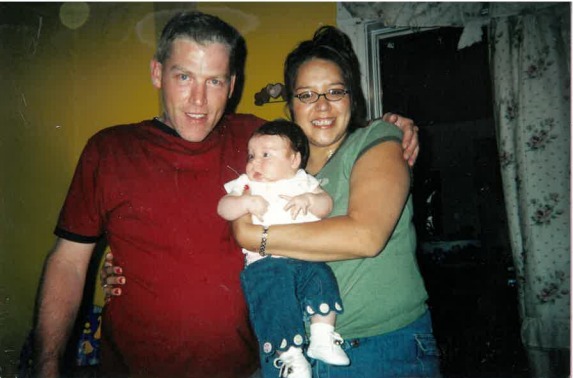The five stages of grief

Used with Permission by Dove Nissen
From left to right: Chris Larson, Daisy Larson, Janelle Hart
May 23, 2022
What is grief? Why does grief have five different stages? Why does grief, although just a simple five-letter word, mean hours, on days, on months of a non-linear roller coaster of emotions? Grief, as defined by Oxford Languages, is the deep sorrow, especially when caused by someone’s death. Grief has always been my next-door neighbor, something that I have one too many times encountered, yet somehow never get close enough to understand. Unlike the temporary grief that I experienced when my first pet, Lulu the bunny, died, the grief of losing both of my parents was permanent.
Denial: the refusal of something requested or desired- the first feeling I had felt after hearing the four words, “Your father has died,” four years shortly after hearing the same about my mother. I ceased to face the overbearing truth that weighed upon me. For months, I had a feeling that they were not actually dead; that this was some sort of sick prank. I even thought that they were hiding somewhere, waiting for me to find them. All of this confusion, denial and pain slowly morphed into one singular and powerful emotion; anger.
Anger: a strong feeling of annoyance, displeasure or hostility. All of my blocked off walls finally crumbled down into bricks of fire. Brick after brick, my once benignant self was torn away by the impatience that arose inside of me. The love that was taken away from me had only compelled me to fight back. Each word I was offered gave me nothing but more sappy sorry’s to add to my book. I began to bargain who, what and why others were around me?
Bargaining: negotiate the terms and conditions of a transaction. Could I have saved my parents from their own deaths? If I had been there the night my mother lost to her addiction, or the morning my father had taken his own life, would they still be here? Everything had shifted into blame, and unfortunately the only person who I resorted to doing so was myself. They tell you that life’s inconsistencies happen for a reason, that all closed doors meant better ones were opening. Was that always going to be the case? How could anything ever replace the spot that my parents had left? With all of the questions I asked myself, nothing could bring them back.
Depression: a mental condition characterized by feelings of severe despondency and dejection, typically also with feelings of inadequacy and guilt. The only way to excuse the sadness I had felt was to consider it a condition beyond the death of a loved one. Depression had been the obvious answer to the restless nights of unbearable sadness and every emotion known to man, but was it me or the losses? As I looked at myself and trembled at the fragile body I had been left with, I knew there was always going to be a girl named Daisy in there.
Acceptance: agreement with or belief in an idea, opinion or explanation. As I sit here and look back at the little girl who was never given a map of what to do in a life without parents, I thank her. I thank her for the unknown that she discovered and became. No, my parents will not be at my 18th birthday, my graduation or my first day of college, but I will be. And inside of me is both of my parents- Chris and Janelle. They no longer live in my head, but in my heart, on display for everyone to see. That is the thing about grief; each stage will always be experienced at one point, but it is the last one that makes or breaks it all.










zoe larson • Jan 5, 2023 at 6:40 pm
slay
anna • May 25, 2022 at 8:12 am
love this and you so much, you are making them so proud everyday <3